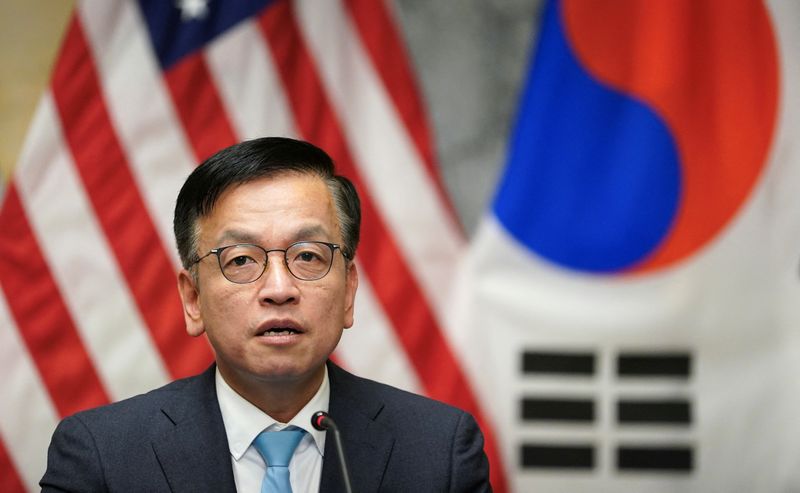Select Language

By Cynthia Kim
SEOUL (Reuters) -South Korea's finance ministry said on Wednesday it is ready to deploy "unlimited" liquidity into financial markets if needed after President Yoon Suk Yeol lifted a martial law declaration he imposed overnight that pushed the won to multi-year lows.
The announcement came after Finance Minister Choi Sang-mok and Bank of Korea Governor Rhee Chang-yong held emergency meetings overnight, and ahead of the BOK's extraordinary meeting session abruptly scheduled for 9 a.m. local time (0000 GMT) on Wednesday.
"All financial, FX markets as well as stock markets will operate normally," the government said in a statement.
"We will inject unlimited liquidity into stocks, bonds, short-term money market as well as forex market for the time being until they are fully normalised."
South Korea's won trimmed some losses early on Wednesday but stayed near two-year lows after Yoon lifted his shock martial law declaration, honoring a parliamentary vote against the measure.
South Korea's parliament, with 190 of its 300 members present, unanimously passed a motion on Wednesday requiring the martial law be lifted.
U.S.-listed South Korean stocks fell, while exchange-traded products in New York including iShares MSCI South Korea ETF and Franklin FTSE South Korea ETF lost about 1% each.
The Korean won also fell sharply against the yen to the weakest since May 2023, down 2.5%.
The political turmoil comes as Yoon and the opposition-controlled parliament clash over the budget and other measures.
The opposition Democratic Party last week cut 4.1 trillion won from the total budget proposal of 677.4 trillion won ($470.7 billion) the Yoon's government submitted, putting the parliament in a deadlock over control of the 2025 annual budget.
The parliamentary speaker on Monday stopped the revised budget from going to a final vote.
A successful budget intervention by the opposition would deal a major blow to Yoon's minority government and risk shrinking fiscal spending at a time when export growth is cooling.
"The negative impact to the economy and financial market could be short-lived as uncertainties on political and economic environment could be quickly mitigated on the back of proactive policy response," Citi economist Kim Jin-wook said in a report.

